Leadership Assessment Report: Self-Assessment, Decision Making, and EI
VerifiedAdded on 2020/01/15
|6
|1453
|213
Report
AI Summary
This report provides an in-depth analysis of leadership assessment, emphasizing the critical role of emotional intelligence (EI), decision-making processes, and self-assessment in effective leadership. It begins by highlighting the increasing need for efficient and prepared leaders in today's competitive market. The report explores the importance of EI, which includes understanding and managing one's own and others' emotions, influencing decision-making styles, and assessing leadership motivation. It details the application of specific tests, such as the matrix EI test, to measure these traits and their impact on organizational contributions. The report further discusses the various components of EI, including self-awareness, self-management, social awareness, and relationship management, and their contributions to leadership effectiveness. It concludes by emphasizing the correlation between these attributes and successful leadership within an organization. This report is a valuable resource for students on Desklib, offering insights into leadership traits and their significance in the professional world.
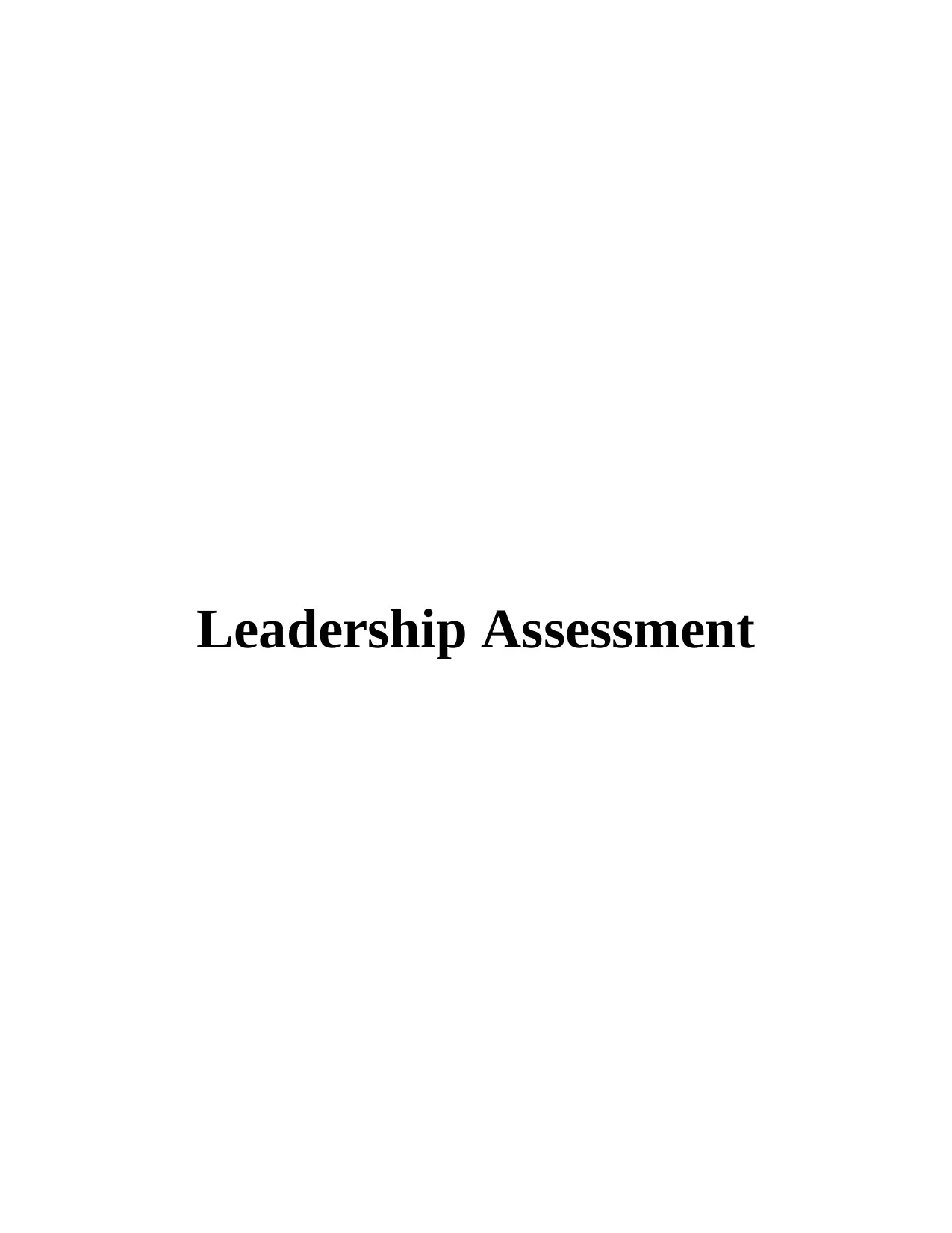
Leadership Assessment
Paraphrase This Document
Need a fresh take? Get an instant paraphrase of this document with our AI Paraphraser

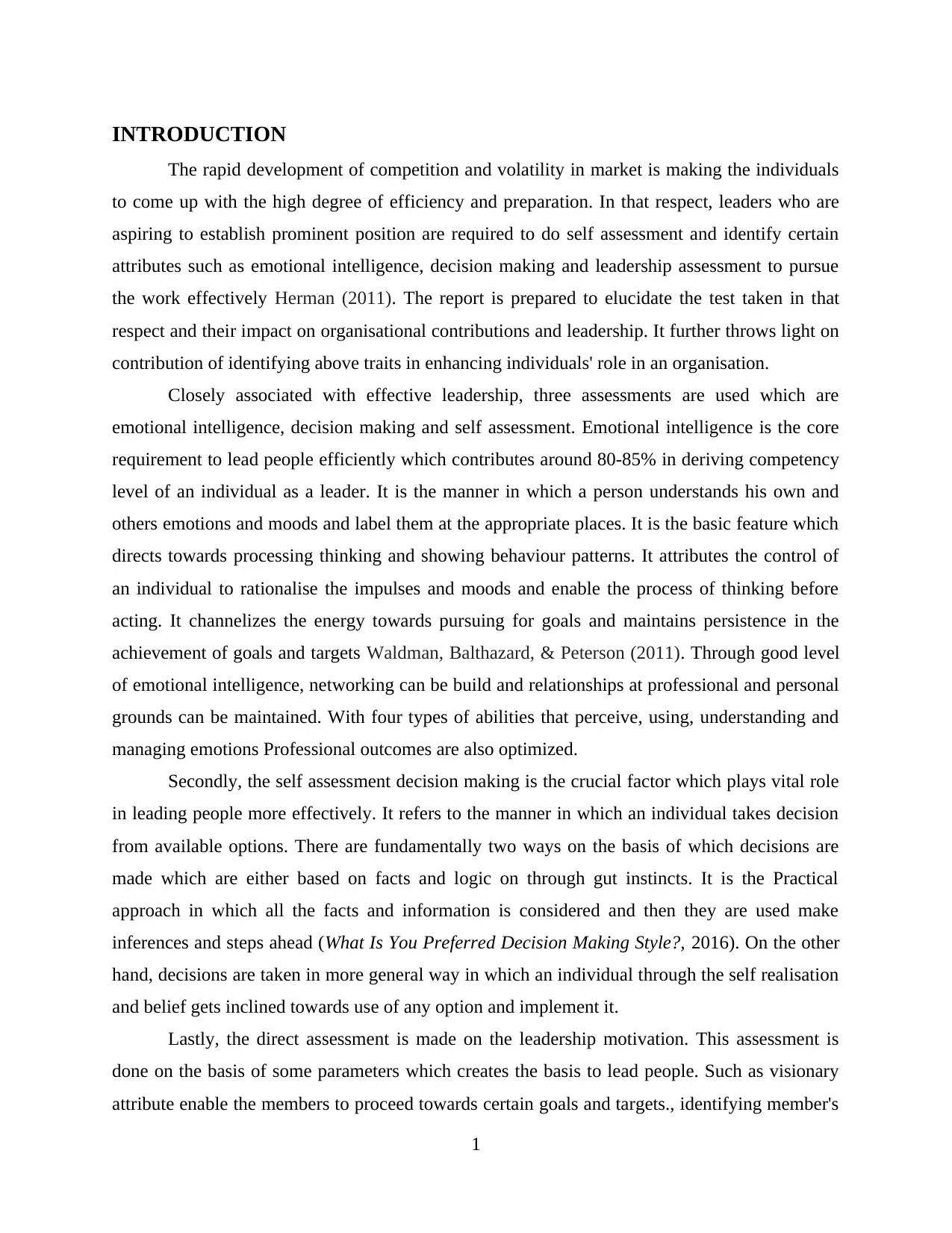
INTRODUCTION
The rapid development of competition and volatility in market is making the individuals
to come up with the high degree of efficiency and preparation. In that respect, leaders who are
aspiring to establish prominent position are required to do self assessment and identify certain
attributes such as emotional intelligence, decision making and leadership assessment to pursue
the work effectively Herman (2011). The report is prepared to elucidate the test taken in that
respect and their impact on organisational contributions and leadership. It further throws light on
contribution of identifying above traits in enhancing individuals' role in an organisation.
Closely associated with effective leadership, three assessments are used which are
emotional intelligence, decision making and self assessment. Emotional intelligence is the core
requirement to lead people efficiently which contributes around 80-85% in deriving competency
level of an individual as a leader. It is the manner in which a person understands his own and
others emotions and moods and label them at the appropriate places. It is the basic feature which
directs towards processing thinking and showing behaviour patterns. It attributes the control of
an individual to rationalise the impulses and moods and enable the process of thinking before
acting. It channelizes the energy towards pursuing for goals and maintains persistence in the
achievement of goals and targets Waldman, Balthazard, & Peterson (2011). Through good level
of emotional intelligence, networking can be build and relationships at professional and personal
grounds can be maintained. With four types of abilities that perceive, using, understanding and
managing emotions Professional outcomes are also optimized.
Secondly, the self assessment decision making is the crucial factor which plays vital role
in leading people more effectively. It refers to the manner in which an individual takes decision
from available options. There are fundamentally two ways on the basis of which decisions are
made which are either based on facts and logic on through gut instincts. It is the Practical
approach in which all the facts and information is considered and then they are used make
inferences and steps ahead (What Is You Preferred Decision Making Style?, 2016). On the other
hand, decisions are taken in more general way in which an individual through the self realisation
and belief gets inclined towards use of any option and implement it.
Lastly, the direct assessment is made on the leadership motivation. This assessment is
done on the basis of some parameters which creates the basis to lead people. Such as visionary
attribute enable the members to proceed towards certain goals and targets., identifying member's
1
The rapid development of competition and volatility in market is making the individuals
to come up with the high degree of efficiency and preparation. In that respect, leaders who are
aspiring to establish prominent position are required to do self assessment and identify certain
attributes such as emotional intelligence, decision making and leadership assessment to pursue
the work effectively Herman (2011). The report is prepared to elucidate the test taken in that
respect and their impact on organisational contributions and leadership. It further throws light on
contribution of identifying above traits in enhancing individuals' role in an organisation.
Closely associated with effective leadership, three assessments are used which are
emotional intelligence, decision making and self assessment. Emotional intelligence is the core
requirement to lead people efficiently which contributes around 80-85% in deriving competency
level of an individual as a leader. It is the manner in which a person understands his own and
others emotions and moods and label them at the appropriate places. It is the basic feature which
directs towards processing thinking and showing behaviour patterns. It attributes the control of
an individual to rationalise the impulses and moods and enable the process of thinking before
acting. It channelizes the energy towards pursuing for goals and maintains persistence in the
achievement of goals and targets Waldman, Balthazard, & Peterson (2011). Through good level
of emotional intelligence, networking can be build and relationships at professional and personal
grounds can be maintained. With four types of abilities that perceive, using, understanding and
managing emotions Professional outcomes are also optimized.
Secondly, the self assessment decision making is the crucial factor which plays vital role
in leading people more effectively. It refers to the manner in which an individual takes decision
from available options. There are fundamentally two ways on the basis of which decisions are
made which are either based on facts and logic on through gut instincts. It is the Practical
approach in which all the facts and information is considered and then they are used make
inferences and steps ahead (What Is You Preferred Decision Making Style?, 2016). On the other
hand, decisions are taken in more general way in which an individual through the self realisation
and belief gets inclined towards use of any option and implement it.
Lastly, the direct assessment is made on the leadership motivation. This assessment is
done on the basis of some parameters which creates the basis to lead people. Such as visionary
attribute enable the members to proceed towards certain goals and targets., identifying member's
1
⊘ This is a preview!⊘
Do you want full access?
Subscribe today to unlock all pages.

Trusted by 1+ million students worldwide
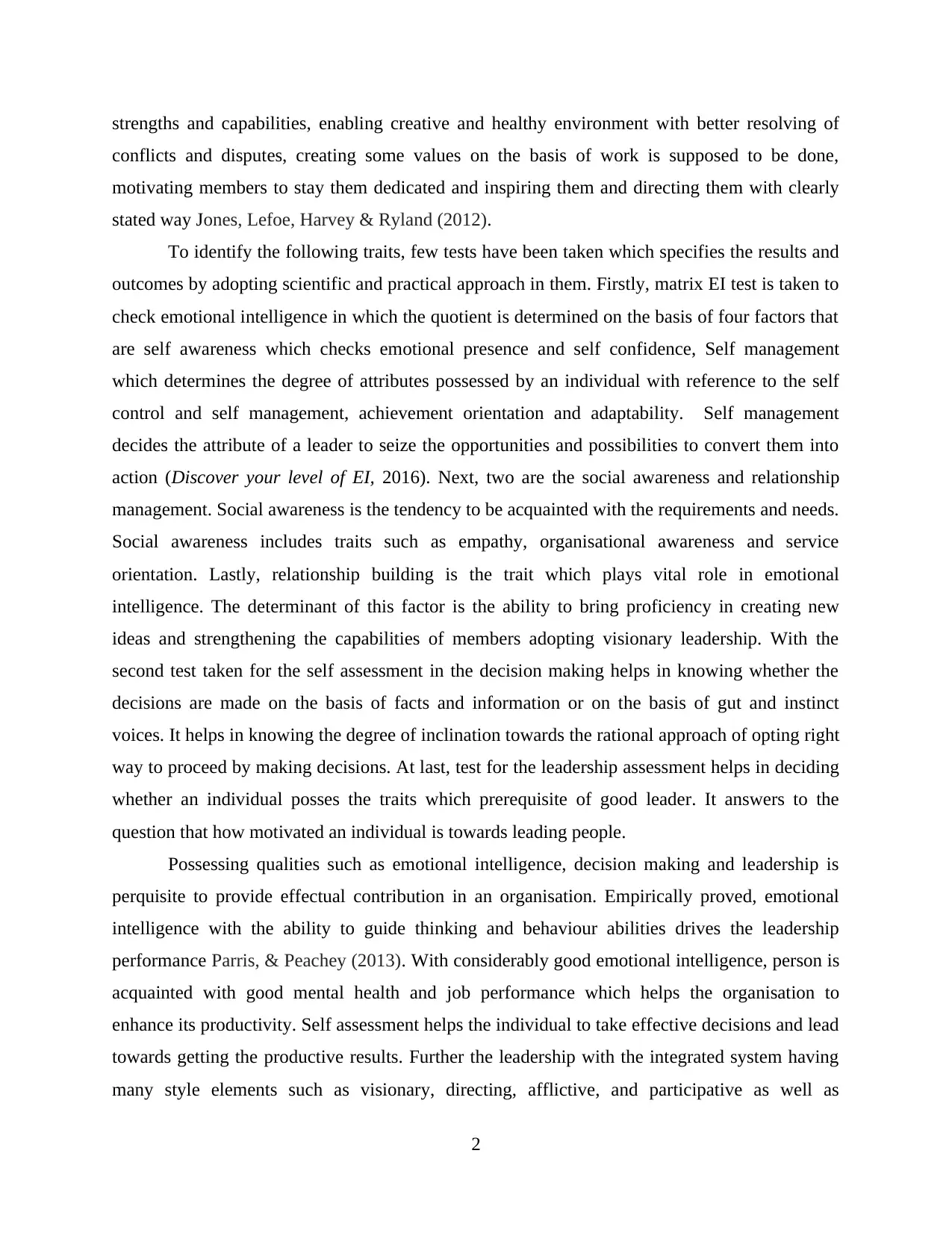
strengths and capabilities, enabling creative and healthy environment with better resolving of
conflicts and disputes, creating some values on the basis of work is supposed to be done,
motivating members to stay them dedicated and inspiring them and directing them with clearly
stated way Jones, Lefoe, Harvey & Ryland (2012).
To identify the following traits, few tests have been taken which specifies the results and
outcomes by adopting scientific and practical approach in them. Firstly, matrix EI test is taken to
check emotional intelligence in which the quotient is determined on the basis of four factors that
are self awareness which checks emotional presence and self confidence, Self management
which determines the degree of attributes possessed by an individual with reference to the self
control and self management, achievement orientation and adaptability. Self management
decides the attribute of a leader to seize the opportunities and possibilities to convert them into
action (Discover your level of EI, 2016). Next, two are the social awareness and relationship
management. Social awareness is the tendency to be acquainted with the requirements and needs.
Social awareness includes traits such as empathy, organisational awareness and service
orientation. Lastly, relationship building is the trait which plays vital role in emotional
intelligence. The determinant of this factor is the ability to bring proficiency in creating new
ideas and strengthening the capabilities of members adopting visionary leadership. With the
second test taken for the self assessment in the decision making helps in knowing whether the
decisions are made on the basis of facts and information or on the basis of gut and instinct
voices. It helps in knowing the degree of inclination towards the rational approach of opting right
way to proceed by making decisions. At last, test for the leadership assessment helps in deciding
whether an individual posses the traits which prerequisite of good leader. It answers to the
question that how motivated an individual is towards leading people.
Possessing qualities such as emotional intelligence, decision making and leadership is
perquisite to provide effectual contribution in an organisation. Empirically proved, emotional
intelligence with the ability to guide thinking and behaviour abilities drives the leadership
performance Parris, & Peachey (2013). With considerably good emotional intelligence, person is
acquainted with good mental health and job performance which helps the organisation to
enhance its productivity. Self assessment helps the individual to take effective decisions and lead
towards getting the productive results. Further the leadership with the integrated system having
many style elements such as visionary, directing, afflictive, and participative as well as
2
conflicts and disputes, creating some values on the basis of work is supposed to be done,
motivating members to stay them dedicated and inspiring them and directing them with clearly
stated way Jones, Lefoe, Harvey & Ryland (2012).
To identify the following traits, few tests have been taken which specifies the results and
outcomes by adopting scientific and practical approach in them. Firstly, matrix EI test is taken to
check emotional intelligence in which the quotient is determined on the basis of four factors that
are self awareness which checks emotional presence and self confidence, Self management
which determines the degree of attributes possessed by an individual with reference to the self
control and self management, achievement orientation and adaptability. Self management
decides the attribute of a leader to seize the opportunities and possibilities to convert them into
action (Discover your level of EI, 2016). Next, two are the social awareness and relationship
management. Social awareness is the tendency to be acquainted with the requirements and needs.
Social awareness includes traits such as empathy, organisational awareness and service
orientation. Lastly, relationship building is the trait which plays vital role in emotional
intelligence. The determinant of this factor is the ability to bring proficiency in creating new
ideas and strengthening the capabilities of members adopting visionary leadership. With the
second test taken for the self assessment in the decision making helps in knowing whether the
decisions are made on the basis of facts and information or on the basis of gut and instinct
voices. It helps in knowing the degree of inclination towards the rational approach of opting right
way to proceed by making decisions. At last, test for the leadership assessment helps in deciding
whether an individual posses the traits which prerequisite of good leader. It answers to the
question that how motivated an individual is towards leading people.
Possessing qualities such as emotional intelligence, decision making and leadership is
perquisite to provide effectual contribution in an organisation. Empirically proved, emotional
intelligence with the ability to guide thinking and behaviour abilities drives the leadership
performance Parris, & Peachey (2013). With considerably good emotional intelligence, person is
acquainted with good mental health and job performance which helps the organisation to
enhance its productivity. Self assessment helps the individual to take effective decisions and lead
towards getting the productive results. Further the leadership with the integrated system having
many style elements such as visionary, directing, afflictive, and participative as well as
2
Paraphrase This Document
Need a fresh take? Get an instant paraphrase of this document with our AI Paraphraser
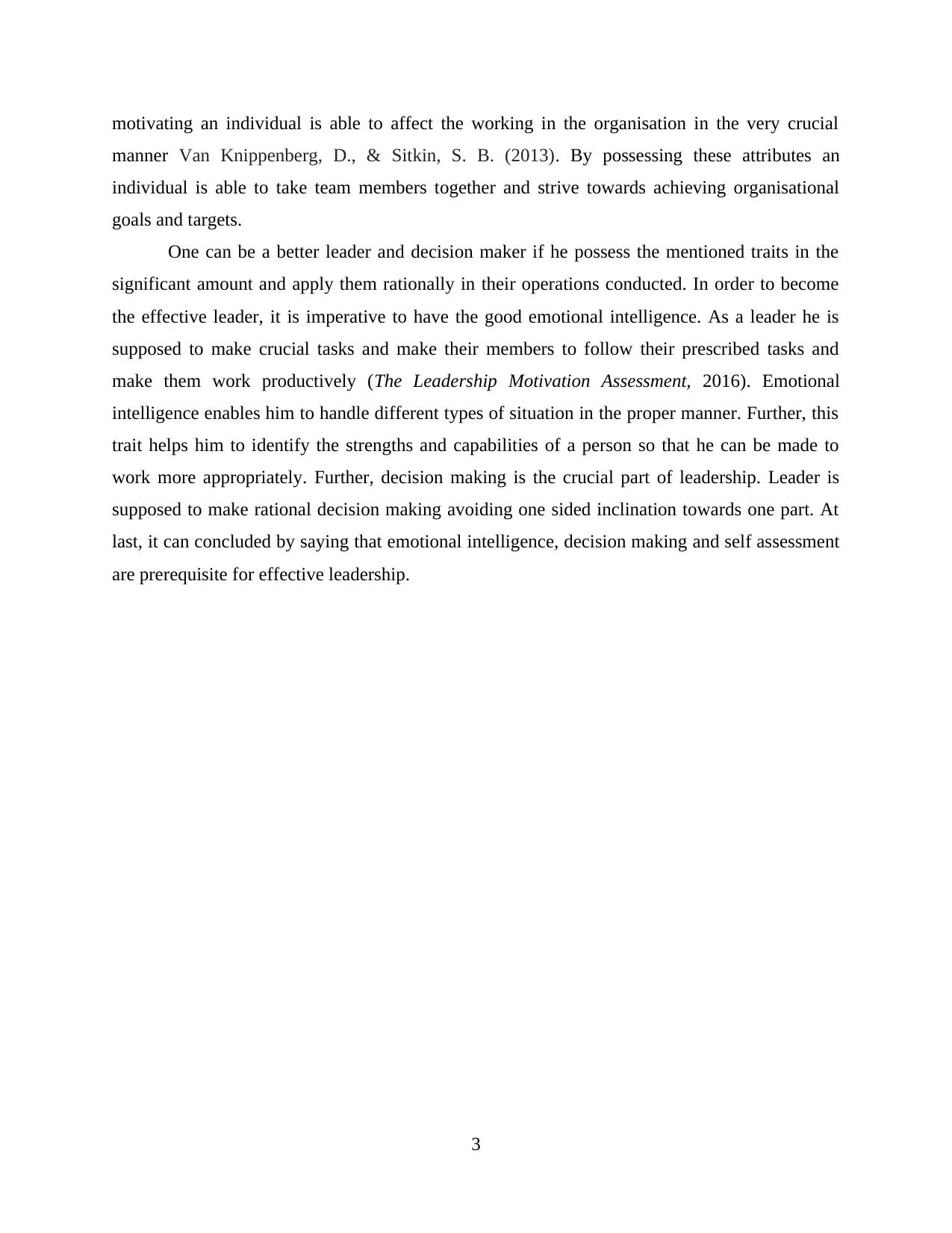
motivating an individual is able to affect the working in the organisation in the very crucial
manner Van Knippenberg, D., & Sitkin, S. B. (2013). By possessing these attributes an
individual is able to take team members together and strive towards achieving organisational
goals and targets.
One can be a better leader and decision maker if he possess the mentioned traits in the
significant amount and apply them rationally in their operations conducted. In order to become
the effective leader, it is imperative to have the good emotional intelligence. As a leader he is
supposed to make crucial tasks and make their members to follow their prescribed tasks and
make them work productively (The Leadership Motivation Assessment, 2016). Emotional
intelligence enables him to handle different types of situation in the proper manner. Further, this
trait helps him to identify the strengths and capabilities of a person so that he can be made to
work more appropriately. Further, decision making is the crucial part of leadership. Leader is
supposed to make rational decision making avoiding one sided inclination towards one part. At
last, it can concluded by saying that emotional intelligence, decision making and self assessment
are prerequisite for effective leadership.
3
manner Van Knippenberg, D., & Sitkin, S. B. (2013). By possessing these attributes an
individual is able to take team members together and strive towards achieving organisational
goals and targets.
One can be a better leader and decision maker if he possess the mentioned traits in the
significant amount and apply them rationally in their operations conducted. In order to become
the effective leader, it is imperative to have the good emotional intelligence. As a leader he is
supposed to make crucial tasks and make their members to follow their prescribed tasks and
make them work productively (The Leadership Motivation Assessment, 2016). Emotional
intelligence enables him to handle different types of situation in the proper manner. Further, this
trait helps him to identify the strengths and capabilities of a person so that he can be made to
work more appropriately. Further, decision making is the crucial part of leadership. Leader is
supposed to make rational decision making avoiding one sided inclination towards one part. At
last, it can concluded by saying that emotional intelligence, decision making and self assessment
are prerequisite for effective leadership.
3
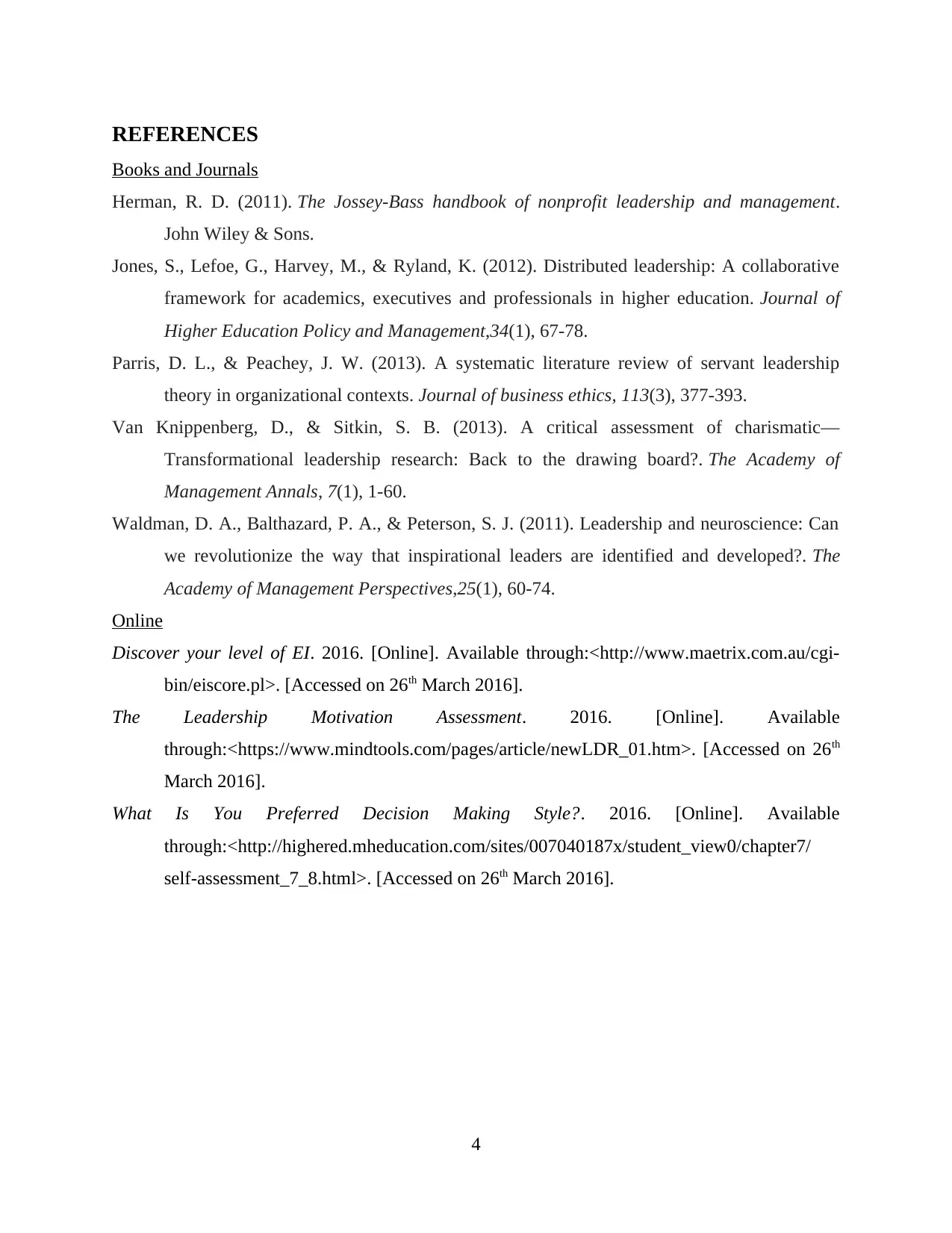
REFERENCES
Books and Journals
Herman, R. D. (2011). The Jossey-Bass handbook of nonprofit leadership and management.
John Wiley & Sons.
Jones, S., Lefoe, G., Harvey, M., & Ryland, K. (2012). Distributed leadership: A collaborative
framework for academics, executives and professionals in higher education. Journal of
Higher Education Policy and Management,34(1), 67-78.
Parris, D. L., & Peachey, J. W. (2013). A systematic literature review of servant leadership
theory in organizational contexts. Journal of business ethics, 113(3), 377-393.
Van Knippenberg, D., & Sitkin, S. B. (2013). A critical assessment of charismatic—
Transformational leadership research: Back to the drawing board?. The Academy of
Management Annals, 7(1), 1-60.
Waldman, D. A., Balthazard, P. A., & Peterson, S. J. (2011). Leadership and neuroscience: Can
we revolutionize the way that inspirational leaders are identified and developed?. The
Academy of Management Perspectives,25(1), 60-74.
Online
Discover your level of EI. 2016. [Online]. Available through:<http://www.maetrix.com.au/cgi-
bin/eiscore.pl>. [Accessed on 26th March 2016].
The Leadership Motivation Assessment. 2016. [Online]. Available
through:<https://www.mindtools.com/pages/article/newLDR_01.htm>. [Accessed on 26th
March 2016].
What Is You Preferred Decision Making Style?. 2016. [Online]. Available
through:<http://highered.mheducation.com/sites/007040187x/student_view0/chapter7/
self-assessment_7_8.html>. [Accessed on 26th March 2016].
4
Books and Journals
Herman, R. D. (2011). The Jossey-Bass handbook of nonprofit leadership and management.
John Wiley & Sons.
Jones, S., Lefoe, G., Harvey, M., & Ryland, K. (2012). Distributed leadership: A collaborative
framework for academics, executives and professionals in higher education. Journal of
Higher Education Policy and Management,34(1), 67-78.
Parris, D. L., & Peachey, J. W. (2013). A systematic literature review of servant leadership
theory in organizational contexts. Journal of business ethics, 113(3), 377-393.
Van Knippenberg, D., & Sitkin, S. B. (2013). A critical assessment of charismatic—
Transformational leadership research: Back to the drawing board?. The Academy of
Management Annals, 7(1), 1-60.
Waldman, D. A., Balthazard, P. A., & Peterson, S. J. (2011). Leadership and neuroscience: Can
we revolutionize the way that inspirational leaders are identified and developed?. The
Academy of Management Perspectives,25(1), 60-74.
Online
Discover your level of EI. 2016. [Online]. Available through:<http://www.maetrix.com.au/cgi-
bin/eiscore.pl>. [Accessed on 26th March 2016].
The Leadership Motivation Assessment. 2016. [Online]. Available
through:<https://www.mindtools.com/pages/article/newLDR_01.htm>. [Accessed on 26th
March 2016].
What Is You Preferred Decision Making Style?. 2016. [Online]. Available
through:<http://highered.mheducation.com/sites/007040187x/student_view0/chapter7/
self-assessment_7_8.html>. [Accessed on 26th March 2016].
4
⊘ This is a preview!⊘
Do you want full access?
Subscribe today to unlock all pages.

Trusted by 1+ million students worldwide
1 out of 6
Related Documents
Your All-in-One AI-Powered Toolkit for Academic Success.
+13062052269
info@desklib.com
Available 24*7 on WhatsApp / Email
![[object Object]](/_next/static/media/star-bottom.7253800d.svg)
Unlock your academic potential
© 2024 | Zucol Services PVT LTD | All rights reserved.





